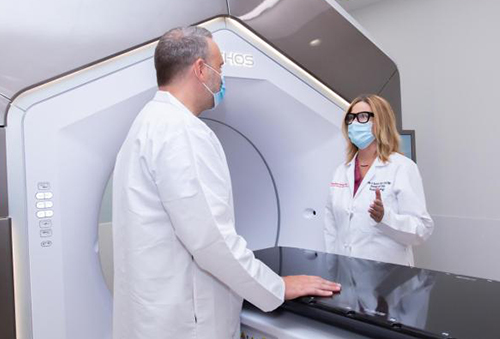Radiation therapy using artificial intelligence – one of the latest advances in the field – is now available at NewYork-Presbyterian/Columbia University Irving Medical Center to treat certain cancers. The new radiation delivery machine, Ethos, is the first of its kind in the New York metropolitan area and surrounding region that uses AI to efficiently fine-tune a patient’s daily radiation treatment. Ethos enables radiation oncologists to quickly recalculate treatment to account for changes in the size and shape of the tumor and accommodate any anatomical changes in the patient.
With the new system – adaptive online radiation therapy – patient treatment plans can be reassessed and optimized before every session. This allows the maximal radiation dose to be delivered to the tumor while reducing the risk of irradiating nearby healthy tissues and providing potentially better cancer control.

Dr. Lisa Kachnic

Dr. Tony Wang
“The treatment is static, but the patient and tumor are not,” says Lisa A. Kachnic, MD, Chief of the Radiation Oncology Service at NewYork-Presbyterian/Columbia and Professor and Chair of the Department of Radiation Oncology at Columbia. “The tumor can shrink or grow, and the patient’s physiology can change. If you choose to replan treatment, then you must go through the whole process again, which can involve hours of work.”
“Radiation oncologists have long recognized this issue, but we haven’t had the technological capability or computing power to recalculate the treatment plan quickly enough to account for these changes without causing a delay in treatment,” says Tony J. Wang, MD, Co-Director of the Center for Radiosurgery and Professor of Radiation Oncology at Columbia.
The new advance solves a long-standing issue in radiation oncology – the difficulty of adapting treatment to anatomical changes in the patient or the tumor that can occur during the many weeks of therapy.
“The benefits to the patient are potentially substantial,” adds Michael Price, PhD, Vice Chair for Physics and Director of Enterprise Technical Strategy and Innovation and Associate Professor of Radiation Oncology at Columbia. “With conventional radiotherapy, if a tumor shrinks after several weeks of treatment, the patient still receives radiation designed for the full-sized tumor. While we can create a new plan based on these changes, it frequently leads to a pause in a patient’s course of treatment since it may require an additional CT scan and time to create a new plan from scratch.”

Dr. Lisa Kachnic and Dr. Michael Price with Ethos, a new AI-based adaptive radiation accelerator machine
With adaptive online radiation therapy, the plan is automatically recalculated based on the patient’s condition during each treatment. This allows clinicians to offer a highly personalized therapy with potentially better cancer control while simultaneously reducing radiation side effects. The system uses 3-D CT imaging to identify changes in the patient’s anatomy, including the tumor and nearby structures, that have occurred since the patient was last treated. A machine learning module automatically recalculates the plan based on these changes. Each recalculated treatment plan is reviewed and approved by the radiation therapy team before implementation. The entire process adds only a few minutes to each treatment.
Currently, the system may be used to treat patients with cervical and rectal cancers located near organs that frequently change in volume, such as the bladder, bowel, and colon, as well as head and neck cancers that tend to shrink quickly when treated with radiation. “Irradiating large head and neck cancers also poses a risk to nearby structures such as the optic nerve or brainstem,” says Dr. Wang. “With the adaptive system, we can deliver very focused radiation doses to the tumor while reducing the risk to nearby structures.”
“A recent study in patients with cervical or rectal tumors shows that online adaptive radiation therapy improves treatment precision without adding substantial time and resources,” notes Dr. Price. “We are currently planning studies to see if the new system can improve outcomes and reduce side effects for patients with prostate, pancreas, or anal tumors. The adaptive radiotherapy system predicts what the treatment team would do when faced with the patient’s anatomy on the day of treatment versus day zero, giving us the ability to align the plan to the patient. That’s a paradigm shift.”





